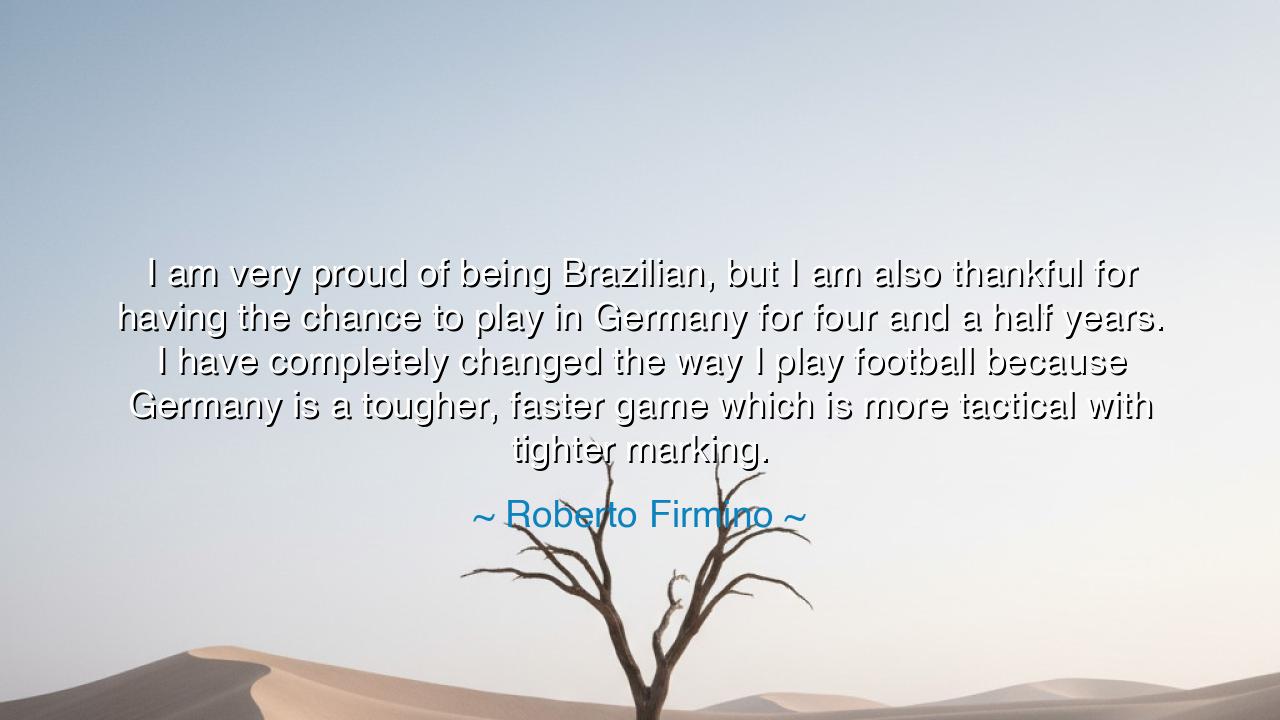
I am very proud of being Brazilian, but I am also thankful for
I am very proud of being Brazilian, but I am also thankful for having the chance to play in Germany for four and a half years. I have completely changed the way I play football because Germany is a tougher, faster game which is more tactical with tighter marking.






The words of Roberto Firmino carry the weight of identity, gratitude, and transformation: “I am very proud of being Brazilian, but I am also thankful for having the chance to play in Germany for four and a half years. I have completely changed the way I play football because Germany is a tougher, faster game which is more tactical with tighter marking.” In this confession lies the eternal struggle and harmony between origin and growth, between one’s roots and one’s journey. He does not deny his pride in being Brazilian, for it is the soil from which he sprang, but he also gives thanks for the sharpening of his skill in foreign lands.
To be thankful for Germany while remaining proud of Brazil reveals the balance every pilgrim of life must learn: to cherish one’s birthplace, but to welcome the lessons of distant fields. Firmino, born into the artistry and rhythm of Brazilian football, found himself forged anew in the steel and discipline of the Bundesliga. There he discovered that beauty in play must also be married to rigor, that flair must be matched by tactical thought, and that survival requires adaptation. Thus his journey reflects an ancient truth: the tree that does not bend in foreign winds will break, but the tree that bends grows stronger still.
The ancients spoke often of such transformations. Consider Alexander the Great, who though Macedonian, learned from the Greeks, the Persians, and the Egyptians, weaving their wisdom into his empire. Or recall St. Augustine, who began as a child of North Africa, yet through the philosophies of Rome and the faith of Christendom, became one of the greatest thinkers of the West. In each story, as in Firmino’s, greatness did not come by rejecting one’s roots, but by allowing them to grow deeper and broader through the nourishment of many soils.
Firmino’s description of Germany as “tougher, faster, more tactical with tighter marking” is more than a comment on sport—it is a reflection on life itself. For life, too, requires adaptation. The one who clings only to what he already knows will falter when new challenges arise. But the one who humbly learns, even when the learning is hard and the lessons sharp, will emerge transformed. Firmino’s football became more complete not by resisting change, but by embracing it. This is the heroic act: to step into discomfort, to be humbled, and to be remade.
What makes his testimony powerful is the union of pride and gratitude. Too often men abandon their roots when they gain new wisdom, or cling so tightly to their origins that they reject all growth. Firmino does neither. He remains proudly Brazilian—keeper of the samba, the street, the joyful rhythm of football—while being thankful for Germany, which demanded precision, discipline, and tactical mastery. In this marriage of styles, he becomes greater than either alone: not just a Brazilian, not just a German-trained player, but a new creation shaped by both.
The lesson here is timeless: honor where you come from, but be willing to be changed by the places you go. Your roots give you identity, but your journeys give you strength. Be thankful for the trials that sharpen you, for the teachers who challenge you, for the foreign fields that force you to adapt. Do not despise them, for they are the furnaces of growth. And never forget your origin, for it is the foundation on which all transformation rests.
Therefore, let us act with this wisdom. When life carries us into new lands—whether schools, careers, relationships, or challenges—let us not cling only to what we know, nor abandon entirely who we are. Let us, like Firmino, walk with pride in our roots and with gratitude for the shaping winds of change. For the wisdom of Roberto Firmino reminds us that the soul, like the player, becomes strong when it honors its birthplace, yet accepts transformation through struggle, discipline, and learning. In this way, life itself becomes a greater game—both beautiful and tactical, both rooted and renewed.






AAdministratorAdministrator
Welcome, honored guests. Please leave a comment, we will respond soon